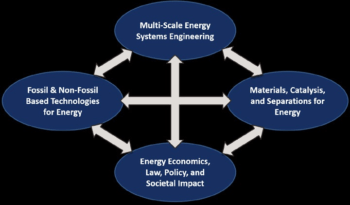New Energy Being Brought To Texas A&M Energy Institute, Looking Locally And Globally
 Energy — an abundance of energy, along with an expansive vision — is what the new director brings to the re-energized Texas A&M Energy Institute. His goal: transform the energy research landscape — in Texas, elsewhere in the United States and beyond — and educate the next generation of leaders in energy.
Energy — an abundance of energy, along with an expansive vision — is what the new director brings to the re-energized Texas A&M Energy Institute. His goal: transform the energy research landscape — in Texas, elsewhere in the United States and beyond — and educate the next generation of leaders in energy.
Prof. Christodoulos A. Floudas also brings to the Texas A&M Energy Institute directorship sterling credentials at various levels: membership in the highly select National Academy of Engineering as well in the Academy of Medicine, Engineering and Science of Texas and, internationally, in the Academy of Athens. In conjunction with joining the Texas A&M University faculty, he is the holder of the Erle Nye ’59 Chair Professorship for Engineering Excellence, and from Princeton, he brings with him the titles of Stephen C. Macaleer ’63 Professor in Engineering and Applied Science, Emeritus, and Professor of Chemical and Biological Engineering, Emeritus.
“Emeritus” designation often conjures up thoughts of someone having retired. Floudas, however, is in the prime of his academic career and, in his case, it means he has left behind his affiliation with the prestigious Ivy League school for an institution where he says he thinks he can best carry out his aspirations in the varied fields and forms of energy.

It was yet another title that set in motion the events that led to Floudas joining the Texas A&M faculty after having been affiliated with Princeton for 29 years. He was selected last year as one of the first Texas A&M University Institute for Advanced Study Faculty Fellows. Such designations are bestowed upon a select group of nationally and internationally renowned engineers, scientists and others who are invited to the campus for extended stays to conduct research, teach and generally interact with the university’s current faculty and students.
Floudas decided to stay permanently, to the delight of university officials and the faculty and students who have had the opportunity to interact with him, according to TIAS Director John Junkins, who was instrumental in attracting him to Texas A&M as a TIAS Faculty Fellow.
“Dr. Floudas first came to my attention when he was nominated to be a TIAS Fellow,” Junkins recalls. “I immediately recognized his remarkable portfolio of accomplishment, and following the approval of the TIAS Advisory Board, it was my great pleasure to help recruit him as a TIAS Fellow. His fellow appointment was very successful and resulted in his recruitment to our permanent faculty under the Chancellor’s Research Initiative.”
“He has hit the ground running with his early momentum as a chemical engineering professor, but more importantly has immediately channeled his enthusiasm into leading a major university institute that fuses broad collaboration of our faculty. Everyone, including me, is extremely excited about his leadership of the Energy Institute,” Junkins emphasizes.
Floudas emphasizes that the Texas A&M Energy Institute is broad-based in its approach and embraces both research and teaching, as well as service to, and interaction with, the public and private sectors.
“At the Texas A&M Energy Institute we are focused on important scientific and technological energy challenges that impact our society,” he explains. “In tandem, special attention is paid to elucidating the complexity among the interacting components of energy, environment, economics, law and public policy.”
The institute’s interdisciplinary research program focuses on the interacting themes of fossil and non-fossil-based technologies for energy; multi-scale energy systems engineering; materials, catalysis and separations for energy; and energy economics, law, policy and societal impact.
The right-to-the-point essence of the institute is reflected in its new website: http://energy.tamu.edu.
Floudas says he considers the institute both a university-level endeavor as well as one operated in association with the Texas A&M Engineering Experiment Station (TEES), the state agency for engineering research that is a member of the Texas A&M University System and works closely with Texas A&M’s Dwight Look College of Engineering.

“To address the urgent need for effective, transformative and sustainable energy solutions requires first the recognition of the importance of all types of natural resources — fossil-based, renewable, non-fossil based, water — their proper utilization and their efficient integration,” Floudas observes. “It also requires the recognition of the important discoveries and advances in materials, catalysis and separations, as well as fundamental advances in multi-scale energy systems engineering approaches for analysis, simulation, synthesis and optimization.”
The comprehensive aspect of Texas A&M — with so many fields and specialties under its administrative framework — was a major factor in Floudas’ decision to affiliate with it on a permanent basis, viewing it as an opportunity to lead in “the study and development of innovative technologies and policies for energy production and energy conservation that meet societal needs.”
He notes the institute is able to draw on faculty from multiple disciplines throughout the university — with more than 200 researchers and related personnel already set to have a role in some phase of its energy-related endeavors. They come from the College of Agriculture and Life Sciences, Dwight Look College of Engineering, College of Geosciences, College of Science, Bush School of Government and Public Service, Mays Business School, College of Liberal Arts and the School of Law.
Drawing on all those resources, the institute is actively pursuing opportunities for research collaborations with counterparts in industry to address the complexity and challenges of important energy problems.
“The Texas A&M Energy Institute’s external partnerships program focuses on establishing a vibrant interactive environment that brings together academia, government and industry to discuss, address and provide transformative solutions to energy challenges,” Floudas notes.
In his quest to “educate the next generation of leaders in energy,” he proposes creating a unique “professional master of science in energy” degree program, and a “certificate in energy” program. Both programs have already received approval at the university level and by The Texas A&M University System Board of Regents and have been presented to the Texas Higher Education Coordinating Board for its approval.
In addition to those proposed new degree programs, the institute engages undergraduate and graduate students and post-doctoral associates from many of those fields and disciplines in its research and related activities, Floudas adds.
Media contact: tamunews@tamu.edu.





